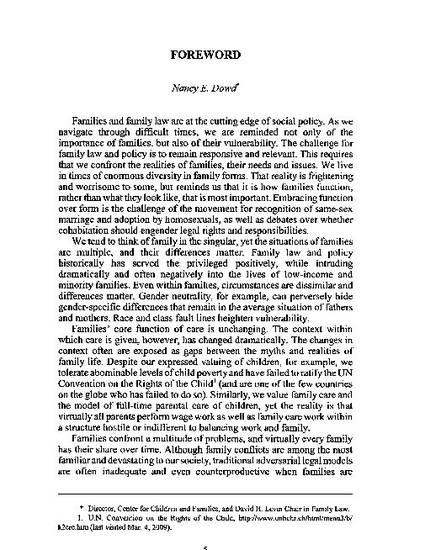
Families and family law are at the cutting edge of social policy. As we navigate through difficult times, we are reminded not only of the importance of families, but also of their vulnerability. The challenge for family law and policy is to remain responsive and relevant. This requires that we confront the realities of families, their needs and issues. We live in times of enormous diversity in family forms. That reality is frightening and worrisome to some, but reminds us that it is how families function, rather than what they look like, that is most important. Embracing function over form is the challenge of the movement for recognition of same-sex marriage and adoption by homosexuals, as well as debates over whether cohabitation should engender legal rights and responsibilities.
We tend to think of family in the singular, yet the situations of families are multiple, and their differences matter. Family law and policy historically has served the privileged positively, while intruding dramatically and often negatively into the lives of low-income and minority families. Even within families, circumstances are dissimilar and differences matter. Gender neutrality, for example, can perversely hide gender-specific differences that remain in the average situation of fathers and mothers. Race and class fault lines heighten vulnerability.
Families' core function of care is unchanging. The context within which care is given, however, has changed dramatically. The changes in context often are exposed as gaps between the myths and realities of family life. Despite our expressed valuing of children, for example, we tolerate abominable levels of child poverty and have failed to ratify the UN Convention on the Rights of the Child (and are one of the few countries on the globe who has failed to do so). Similarly, we value family care and the model of full-time parental care of children, yet the reality is that virtually all parents perform wage work as well as family care work within a structure hostile or indifferent to balancing work and family.
